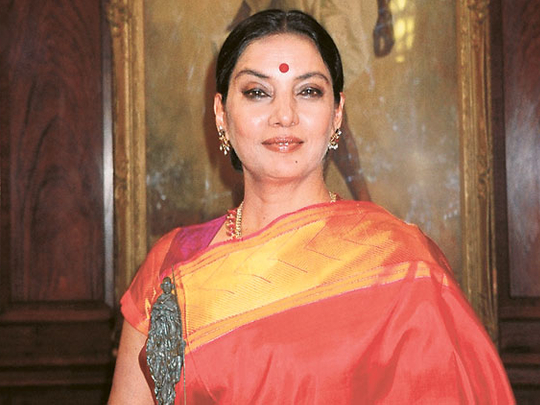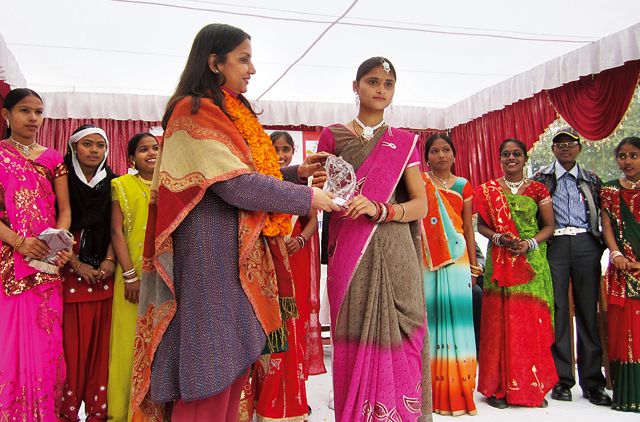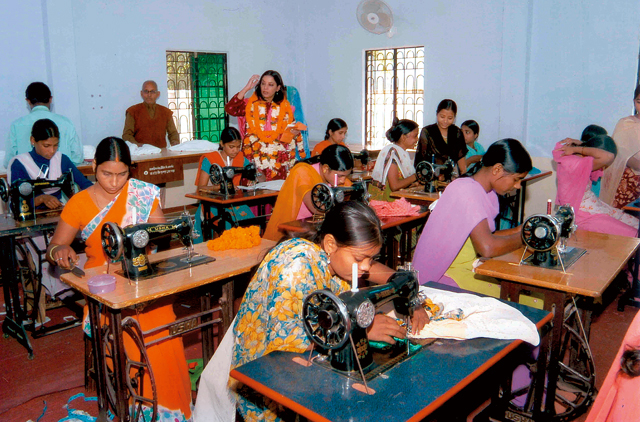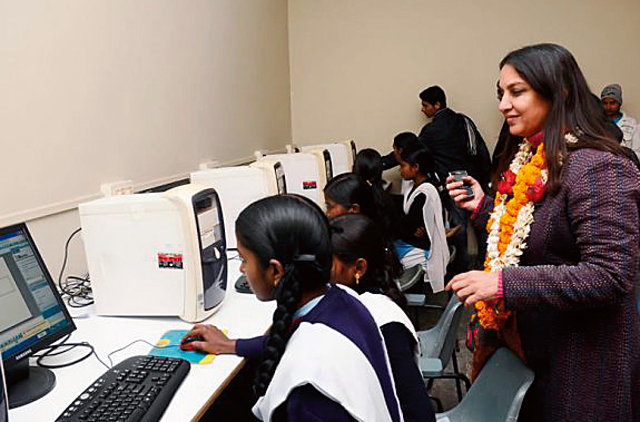
Shabana Azmi needs little introduction to many residents of the UAE. One of India's eminent cultural personalities and the face of independent Indian cinema, she is a regular visitor to Dubai as a performer in the city's budding theatre scene. However, there is one facet of her persona that not many people - particularly those in this region - know of. Growing up in a family that believed "art should be used as an instrument for social change," Shabana is also a committed social advocate who has often used her star-power to promote issues such as gender equality and women's empowerment in society.
In Dubai recently for a theatre performance, Friday met up with Shabana to ask her about the subject she is most passionate about - the Mijwan Welfare Society (MWS), an NGO set up by her late father - renowned Urdu poet, Kaifi Azmi - in 1993, which works for the empowerment of villagers in remote Mijwan in Azamgarh, Uttar Pradesh, India.
A charitable calling
Born into a family of landowners in Mijwan, Shabana's father, Kaifi Azmi, moved to Mumbai in his early 20s. However, it was in the late 1970s, a few years after a stroke left him paralysed, that Mijwan began to haunt his thoughts, remembers his daughter.
"He said that Mijwan kept coming to him as if it was a calling," recollects Shabana.
This was a call he refused to ignore, and in 1979, Kaifi took along Shabana to return to the village of his childhood. "Mijwan seemed like a village frozen in time," recalls Shabana. "There was no electricity, roads or clinics. Girls were married off in their pre-teens; and education was unheard of. My father vowed to bring Mijwan on the path of progress."
That marked the beginning of regular visits to his hometown. "He was like a man possessed; a man on a mission. It didn't even occur to him that being in a wheelchair or being partially paralysed was a handicap. He was keen to root out the inequality and gender bias he saw in Mijwan."
Kaifi's first priority was to build a road to provide a link to other towns and villages.
Next on his list was building a girl's school - but this one was met with stiff opposition as locals felt it was a wasteful expenditure seeing as girls were usually married by the age of 12. Kaifi's wife, Shaukat, a theatre performer, resorted to staging short plays to drive home the importance of education. "The village folk were also not willing to give up the land earmarked for the school, which they were using for community purposes," says Shabana.
But her father remained undeterred. He offered the villagers another piece of land and, over the years, donated all of his inherited estate to the village.
Years later, when a school to teach girls embroidery was set up, Shabana went house-to-house, urging residents to send their women to learn sewing. "That women would step out to work was totally unacceptable in this male-dominated society," she says. "But on realising it would bring in additional income, the men became open to the idea. It also helped to change the woman's position in the family - she was no longer seen as a liability but as an asset. Today a women are now perceived as on a par with their brothers and husband."
Kaifi worked hard to bring basic essentials to this community of 540 members. Mijwan got its first tube well, its first post office, its first school and, much later, an intermediate college and computer centre, as well as the sewing and embroidery school.
The initial years were the most frustrating, says Shabana, "Change did not come easily but my father never lost his motivation. Curious, I questioned him about it once and he calmly replied: ‘When you are working for change, you should build into that expectation the possibility that the change might not happen in your lifetime. But you must have the conviction that if you carry on working with dedication then the change is bound to occur - even if it happens after your lifetime.'"
Legacy of love
Shabana remembers her father's words as she takes his dream forward on her own following his death in May 2002.
The emphasis continues to be on empowering girls, she says. Last year, some girls stepped out of the village for the first time to attend a national-level youth competition in Jaipur, Rajasthan, and bagged the first prize for performing a play they had written themselves against dowries.
"What was heartening," says Shabana, "was that one of the girls, on receiving the trophy said, ‘we have proved our worth; we can now look up at our parents and say we refuse to marry before 18. We have other dreams too.' That, to me, was much more moving than having any number of school buildings or computers, because this is a mind-set change. This is the process of transformation my father dreamed about."
Earlier this year, the Kaifi Azmi Embroidery and Sewing Centre was also in the limelight when top Indian movie actors walked the catwalk at an MWS fashion show fund-raiser wearing clothes designed by celebrity designer, Manish Malhotra, created using fabrics embroidered by the female students. Impressed by the girls' work, Malhotra has also adopted Mijwan in order to promote chikankari, a type of embroidery, among its women and girls.
Shabana says, "One of the young Mijwan girls who attended the event said: ‘I want to be a supermodel'! Another wants to be a computer engineer. There was a time not so long ago when 12-year-old girls would be married and at home! Today these girls have other aspirations. It reinstates my belief that to break the shackles of debilitating tradition we need to give girls equal opportunity and quality education."
Mijwan Welfare Society has received a burst of fresh energy due to the efforts of Namrata Goyal, the youth president of the organisation, says Shabana.
She brought on board India's popular Bollywood actor, Ranbir Kapoor, to serve as the Goodwill Ambassador for the charity. "Urban youngsters are astounded that all it takes is Rs6,000 (around Dh500) to see a child through school and computer classes for a year, when they spend ten times that amount on a night out," says Shabana. "I feel if you can sensitise the youth and get them involved, you will see change happen quickly because globally, the youth are now at the helm of change; they are our greatest resource base."
Making a difference
Who: Shabana Azmi
What: Mijwan Welfare Society
Where: Mijwan, Azamgarh, India
How: empowering women through education and training
Sangeetha Swaroop is a Dubai-based writer














